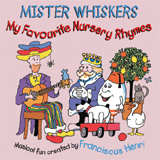This is a list of notable events in music that took place in the year 1909.

"Ahab the Arab" is a novelty song written and recorded by Ray Stevens in 1962.
A children's song may be a nursery rhyme set to music, a song that children invent and share among themselves or a modern creation intended for entertainment, use in the home or education. Although children's songs have been recorded and studied in some cultures more than others, they appear to be universal in human society.
"A-Tisket, A-Tasket" is a nursery rhyme first recorded in America in the late 19th century. The melody to which the nursery rhyme is sung recurs in other nursery rhymes including "It's Raining, It's Pouring"; "Rain Rain Go Away" and "Ring around the Rosie". It was further used as the basis for a successful 1938 recording by Ella Fitzgerald, composed by Fitzgerald in conjunction with Al Feldman.

Ada Jane Jones was an English-American popular singer who made her first recordings in 1893 on Edison cylinders. She is among the earliest female singers to be recorded.

"Ding Dong Bell" or "Ding Dong Dell" is a popular English language nursery rhyme. It has a Roud Folk Song Index number of 12853.

Belles on Their Toes is a 1950 autobiographical book written by the siblings Frank Bunker Gilbreth, Jr. and Ernestine Gilbreth Carey. It is the follow-up to their book Cheaper by the Dozen (1948), and covers the period after Frank Gilbreth, Sr. died. It was adapted as a film in 1952.

Come Josephine In My Flying Machine is a popular song with music by Fred Fisher and lyrics by Alfred Bryan. First published in 1910, the composition was originally recorded by Blanche Ring and was, for a time, her signature song. Ada Jones and Billy Murray recorded a duet in November 1910, which was released the following year. There have been many subsequent recordings of the pop standard.

"School Days" is an American popular song written in 1907 by Will D. Cobb and Gus Edwards. Its subject is of a mature couple looking back sentimentally on their childhood together in primary school. The song was featured in a Broadway show of the same name, the first in a series of Edwards' school acts. It was the inspiration for many subsequent school acts, including the Marx Brothers' Fun in Hi Skule, their first major Vaudeville success.

Les cloches de Corneville is an opéra-comique in three acts, composed by Robert Planquette to a libretto by Louis Clairville and Charles Gabet.

Blanche Ring was an American singer and actress in Broadway theatre productions, musicals, and Hollywood motion pictures. She was best known for her rendition of "In the Good Old Summer Time."

Mister Whiskers: My Favourite Nursery Rhymes is the 1998 re-release children's album of My Favourite Nursery Rhymes by Franciscus Henri, both under Australian Broadcasting Corporation (ABC) Music's ABC for Kids. It achieved Gold sales certification due to sales in excess of 35,000 units in Australia. Notably, the album contains 23 separate tracks, but 17 of these are medleys ranging between two and four rhymes each, totalling fifty-five for the album, though many only go through a single chorus. At the ARIA Music Awards of 1994 the original version received a nomination for Best Children's Album.
"Botany Bay" is a song that can be traced back to the musical burlesque, Little Jack Sheppard, staged at the Gaiety Theatre, London, England, in 1885 and in Melbourne, Australia, in 1886. The show was written by Henry Pottinger Stephens and William Yardley, with music composed and arranged by Wilhelm Meyer Lutz. The show's programme credits "Botany Bay" as "Old Air arr. Lutz". Sheet music from Allan & Co. in Australia credits Florian Pascal, the pseudonym of Joseph Williams Jr. (1847–1923), a music publisher and composer who published the show's music. Pascal composed other numbers in the score but received no credit for "Botany Bay" in the programme.

"Ride a Cock Horse to Banbury Cross" is an English language nursery rhyme connected with the English town Banbury in Oxfordshire. It has a Roud Folk Song Index number of 21143.

Mainly Mother Goose is the sixth album by popular children's entertainers Sharon, Lois & Bram, originally released in 1984. It has been re-released several times, but the artwork on the front covers remained basically the same.
A subverted rhyme, teasing rhyme or mind rhyme is the suggestion of a rhyme which is left unsaid and must be inferred by the listener. A rhyme may be subverted either by stopping short, or by replacing the expected word with another. Teasing rhyme is a form of innuendo, where the unsaid word is taboo or completes a sentence indelicately.

The Midnight Sons is a 1909 American musical comedy that was popular upon its release.
The Adventures of Gracie Lou is a British-Australian animated series created by Darren and Helen Simpson, owners of Merry Dance Productions. The show premiered in 2007 on ABC For Kids.












